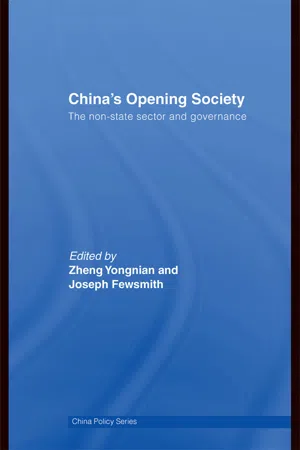
China's Opening Society
The Non-State Sector and Governance
- 256 pages
- English
- ePUB (mobile friendly)
- Available on iOS & Android
China's Opening Society
The Non-State Sector and Governance
About This Book
Despite its recent rapid economic growth, China's political system has remained resolutely authoritarian. However, an increasingly open economy is creating the infrastructure for an open society, with the rise of a non-state sector in which a private economy, non-governmental organizations (NGOs) and different forms of social forces are playing an increasingly powerful role in facilitating political change and promoting good governance. This book examines the development of the non-state sector and NGOs in China since the onset of reform in the late 1970s. It explores the major issues facing the non-state sector in China today, assesses the institutional barriers that are faced by its developing civil society, and compares China's example with wider international experience. It shows how the 'get-rich-quick' ethos of the Deng Xiaoping and Jiang Zemin years, that prioritised rapid GDP growth above all else, has given way under the Jiantao Hu regime to a renewed concern with social reforms, in areas such as welfare, medical care, education, and public transportation. It demonstrates how this change has led to encouragement by the Hu government of the development of the non-state sector as a means to perform regulatory functions and to achieve effective provision of public and social services. It explores the tension between the government's desire to keep the NGOs as "helping hands' rather than as autonomous, independent organizations, and their ability to perform these roles successfully.
Frequently asked questions
Information
Table of contents
- Cover Page
- Title Page
- Copyright Page
- List of tables
- Editors and contributors
- Acknowledgements
- Introduction
- 1 A critical review of the NGO sustainable development philosophy
- 2 Whose civil society is it anyway?
- 3 Non-governmental organizations, non-formal education and civil society in contemporary Russia
- 4 The changing aspects of civil society in China
- 5 NGOs in China: development dynamics and challenges
- 6 The state, firms and corporate social responsibility in China
- 7 The media, internet and governance in China
- 8 Dissecting Chinese county governmental authorities
- 9 Institutional barriers to the development of civil society in China
- 10 Chambers of commerce in Wenzhou: toward civil society?
- 11 How can deliberative institutions be sustainable in China?
- 12 Foreign NGOs’ role in local governance in China
- 13 External actors in the process of village elections: foreign NGOs and China